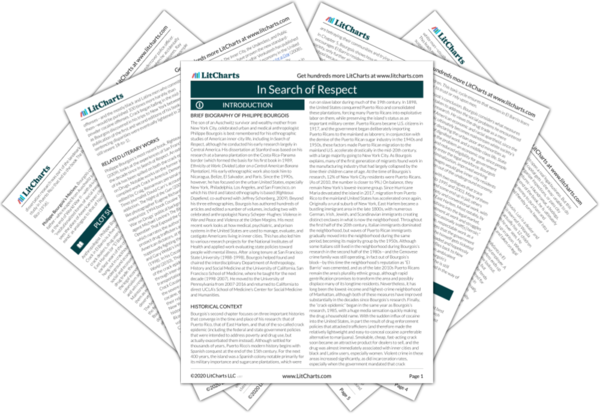Benzie Quotes in In Search of Respect
Primo, Benzie, Maria, and everyone else around that night had never been tête-a-tête with a friendly white before, so it was with a sense of relief that they saw I hung out with them out of genuine interest rather than to obtain drugs or engage in some other act of perdición. The only whites they had ever seen at such close quarters had been school principals, policemen, parole officers, and angry bosses. Even their schoolteachers and social workers were largely African-American and Puerto Rican. Despite his obvious fear, Primo could not hide his curiosity. As he confided in me several months later, he had always wanted a chance to “conversate” with an actual live representative of mainstream, “drug-free” white America.
Contrary to my expectations, most of the dealers had not completely withdrawn from the legal economy. On the contrary—as I have shown in Chapter 3, in discussing the jobs that Willie and Benzie left to become crack dealers and addicts—they are precariously perched on the edge of the legal economy. Their poverty remains their only constant as they alternate between street-level crack dealing and just-above-minimum wage legal employment. The working-class jobs they manage to find are objectively recognized to be among the least desirable in U.S. society; hence the following list of just a few of the jobs held by some of the Game Room regulars during the years I knew them: unlicensed asbestos remover, home attendant, street-corner flyer distributor, deep-fat fry cook, and night-shift security guard on the violent ward at the municipal hospital for the criminally insane.

Benzie Quotes in In Search of Respect
Primo, Benzie, Maria, and everyone else around that night had never been tête-a-tête with a friendly white before, so it was with a sense of relief that they saw I hung out with them out of genuine interest rather than to obtain drugs or engage in some other act of perdición. The only whites they had ever seen at such close quarters had been school principals, policemen, parole officers, and angry bosses. Even their schoolteachers and social workers were largely African-American and Puerto Rican. Despite his obvious fear, Primo could not hide his curiosity. As he confided in me several months later, he had always wanted a chance to “conversate” with an actual live representative of mainstream, “drug-free” white America.
Contrary to my expectations, most of the dealers had not completely withdrawn from the legal economy. On the contrary—as I have shown in Chapter 3, in discussing the jobs that Willie and Benzie left to become crack dealers and addicts—they are precariously perched on the edge of the legal economy. Their poverty remains their only constant as they alternate between street-level crack dealing and just-above-minimum wage legal employment. The working-class jobs they manage to find are objectively recognized to be among the least desirable in U.S. society; hence the following list of just a few of the jobs held by some of the Game Room regulars during the years I knew them: unlicensed asbestos remover, home attendant, street-corner flyer distributor, deep-fat fry cook, and night-shift security guard on the violent ward at the municipal hospital for the criminally insane.











